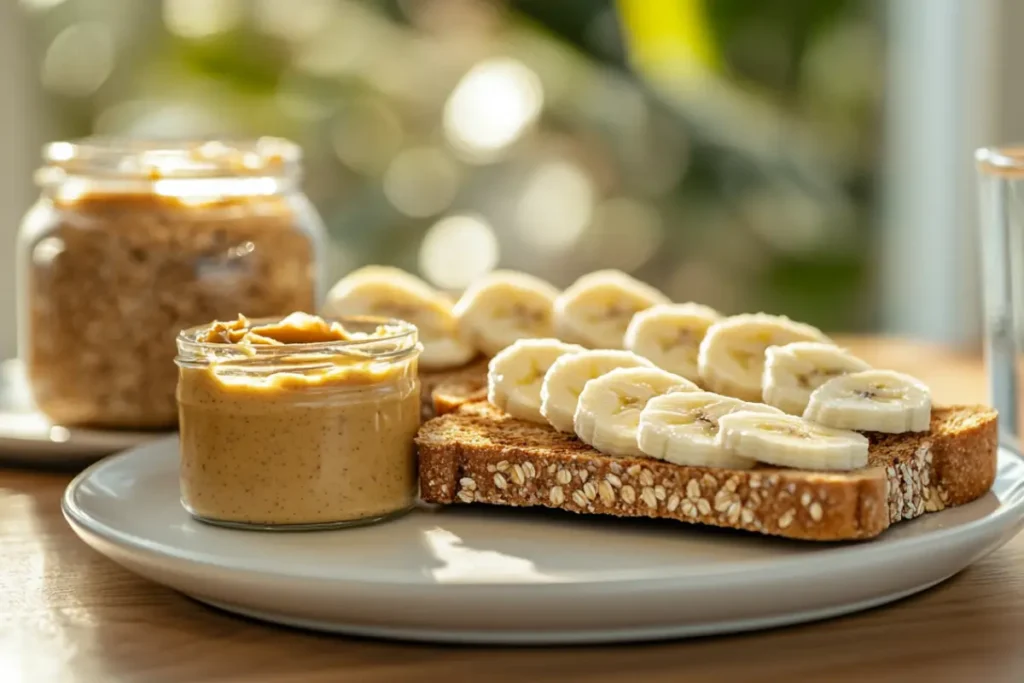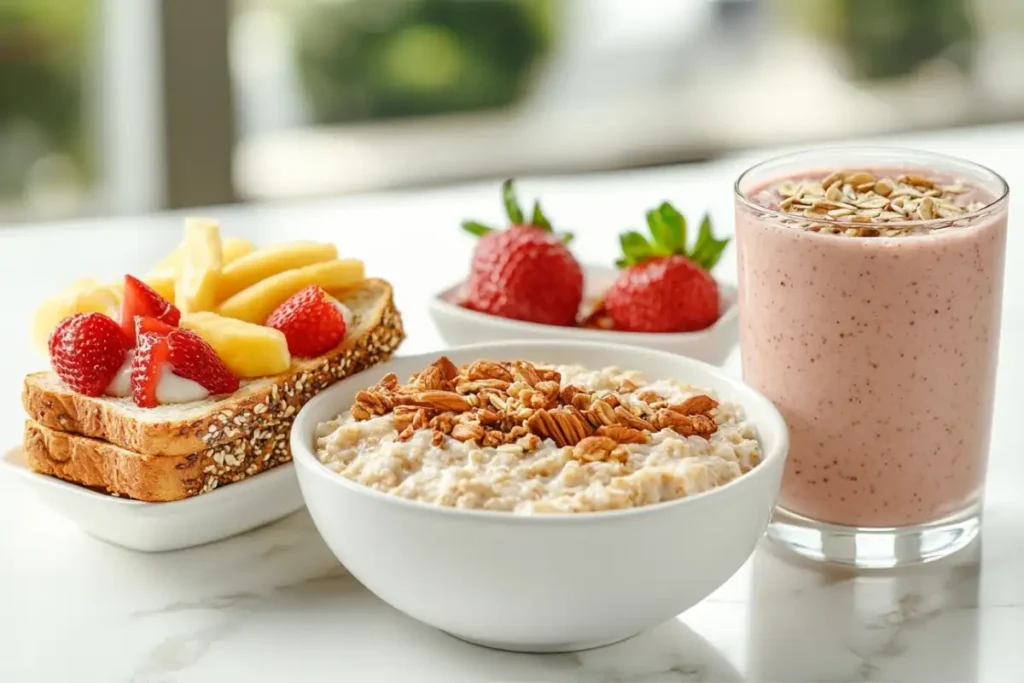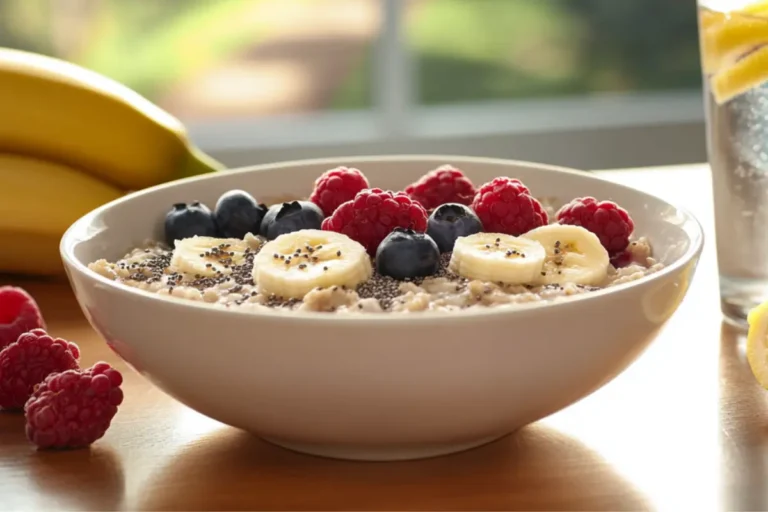Introduction
If you have ever found yourself searching online for “What’s a good breakfast for race day?”, you are in the right place. The right race day breakfast before a 5K, half marathon, or full marathon can make a noticeable difference in your performance. Whether you are a seasoned runner or about to tackle your first race, breakfast plays a pivotal role by providing the energy, focus, and endurance to help you conquer every mile. In this all-inclusive guide, we will explore the best pre-race breakfast strategies, expert insights, practical tips, and step-by-step instructions. By the end, you will have no doubts about what’s a good breakfast for race day and how to optimize your morning meal for success.
1. Why Breakfast Matters on Race Day
The Importance of Morning Fuel
When runners ask, “What’s a good breakfast for race day?”, the first aspect to consider is fueling your body so it can perform at its peak. After a night of fasting, your glycogen stores (the carbohydrates stored in your muscles and liver) can be partially depleted. By consuming a strategic breakfast, you replenish those stores to ensure steady energy throughout the race.
- Preventing early fatigue: Adequate carbohydrates help maintain energy levels, preventing a mid-race slump.
- Maintaining mental focus: A well-fueled brain is crucial for concentration and good decision-making.
- Supporting muscle function: Protein and additional nutrients help keep muscles operating smoothly.
Balancing Macronutrients
Figuring out what’s a good breakfast for race day involves more than simply piling on carbs. A properly balanced pre-race meal generally includes a mix of carbohydrates, protein, and a bit of healthy fats. Each macronutrient contributes to your run:
- Carbohydrates: The main energy source to power your muscles.
- Protein: Helps rebuild and maintain muscle tissue.
- Fats: Offers sustained energy, especially for longer distances, but too much can slow digestion.
Timing Is Key
Many runners wonder about the optimal timing for what’s a good breakfast for race day. Most plan to eat roughly two to three hours before start time, allowing food to settle and digest. This approach helps avoid mid-race discomfort and cramping. If you are short on time and must eat closer to the gun, choose lighter, quickly digestible options.
2. Key Components of a Good Race Day Breakfast

1. Complex Carbohydrates
When people ask, What’s a good breakfast for race day?, one of the top recommendations is complex carbohydrates. These are digested more steadily than simple sugars, ensuring a consistent release of energy and minimizing the risk of crashing mid-race.
- Examples: Oatmeal, whole-grain bread, quinoa, sweet potatoes.
- Tip: Pair complex carbs with a small dose of simple carbs—like honey, jam, or bananas—for an immediate energy boost.
2. Quality Protein Sources
A balanced race day breakfast also includes protein. When runners think of what’s a good breakfast for race day, they might focus primarily on carbs. Yet protein is crucial for muscle support and recovery, preventing hunger pangs mid-run.
- Examples: Eggs, Greek yogurt, low-fat cottage cheese, lean turkey slices, nut butter.
- Tip: Avoid high-fat proteins like bacon or sausage, which can cause digestive upset.
3. Healthy Fats (in Moderation)
Small amounts of healthy fats can offer extended energy, especially if you are racing a half marathon or longer. However, loading up on fats when deciding what’s a good breakfast for race day might lead to GI issues.
- Examples: Avocado, nuts, seeds, or a thin spread of nut butter.
- Avoid: Greasy or fried foods that can upset your stomach.
4. Hydration and Electrolytes
A comprehensive plan for what’s a good breakfast for race day must include hydration. Dehydration can quickly derail performance. Start hydrating well before the race, and continue sipping water up until the start.
- Electrolyte drinks: Low-sugar electrolyte solutions can be beneficial in hot or humid conditions.
- Avoid over-hydration: Too much water right before running can cause discomfort or electrolyte imbalance.
5. Vitamins and Minerals
Although not the central focus of what’s a good breakfast for race day, vitamins and minerals do play a supportive role. Fruits and vegetables supply necessary micronutrients for energy production and muscle function.
- Examples: Berries, bananas, spinach in an omelet, dried fruits in moderation.
3. Timing Your Race Day Breakfast
Eat 2-3 Hours Before the Race
If you’re still unsure about what’s a good breakfast for race day, timing is half the battle. Eating two or three hours before your race start:
- Prevents discomfort or cramping during the run.
- Stabilizes blood sugar to avoid an energy crash.
- Leaves you time for a light warm-up without feeling heavy.
If You’re Short on Time
Sometimes, travel or early start times complicate the perfect plan for what’s a good breakfast for race day. If you have limited time:
- Choose easily digestible foods like a banana with nut butter, a small bowl of oatmeal, or a sports drink.
- Lower fiber intake to reduce stomach issues.
- Stay hydrated but sip water rather than gulping large amounts right before the race.
4. Example Race Day Breakfast Options

Here are some practical recipes if you’re still asking, What’s a good breakfast for race day? Each example strikes a balance of carbs, protein, and a bit of fat.
1. Classic Oatmeal with Banana and Honey
Ingredients
- 1 cup old-fashioned rolled oats
- 2 cups water (or low-fat milk)
- 1 medium banana, sliced
- 1 tablespoon honey
- A pinch of salt (optional)
Step-by-Step Instructions
- Boil the liquid: Bring water or low-fat milk to a light boil in a saucepan.
- Add the oats: Stir in the rolled oats, then reduce heat to a simmer.
- Cook the oats: Let them cook for about 5 minutes, stirring intermittently.
- Add banana and honey: Stir in sliced banana and honey once the oats soften.
- Season: Add a pinch of salt for extra flavor, if you like.
Tips & Tricks
- Boost protein: Mix in a spoonful of nut butter or a scoop of protein powder.
- Alternate sweeteners: Try maple syrup or brown sugar if honey isn’t your preference.
- On the go: Make your oatmeal beforehand, and keep it warm in a thermos.
2. Whole-Grain Toast with Nut Butter and Berries
Ingredients
- 2 slices of whole-grain bread
- 2 tablespoons natural nut butter (peanut, almond, or cashew)
- A handful of fresh berries (strawberries, blueberries, raspberries)
- Drizzle of honey (optional)
Step-by-Step Instructions
- Toast the bread: Crisp the bread to your liking.
- Spread nut butter: While warm, spread nut butter on each slice.
- Top with berries: Pile on the fresh berries.
- Optional sweetener: A little honey can provide extra quick energy.
Tips & Tricks
- Portable option: Wrap it in foil if you need to eat en route to the race.
- Flavor combos: Try different berry mixes for variety.
- Extra protein: Complement it with a small container of Greek yogurt.
3. Egg and Veggie Omelet with Whole-Grain Toast
Ingredients
- 2 eggs (or 3 egg whites for lower fat)
- 1 tablespoon low-fat milk
- A handful of chopped spinach and tomatoes
- A pinch of salt and pepper
- 1 slice of whole-grain toast
Step-by-Step Instructions
- Whisk the eggs: Crack eggs in a bowl, add milk, and whisk.
- Sauté veggies: Lightly cook spinach and tomatoes in a non-stick pan.
- Cook egg mixture: Add the whisked eggs, cooking on medium until edges set.
- Fold: Flip one side of the omelet over the other to cook through.
- Serve with toast: Toast a slice of whole-grain bread to round out this “what’s a good breakfast for race day” meal.
Tips & Tricks
- Low-fat option: Use cooking spray instead of oil to minimize fat.
- Add cheese: Low-fat cheese can offer extra flavor without too much fat.
- Control portions: If you have pre-race nerves, reduce portion size for comfort.
4. Greek Yogurt Parfait with Granola and Fruit
Ingredients
- 1 cup low-fat Greek yogurt
- 1/2 cup granola (low-sugar variety)
- 1/2 cup mixed berries (fresh or frozen)
- A drizzle of honey or agave syrup
Step-by-Step Instructions
- Layer yogurt: Spoon half of the Greek yogurt into a bowl or jar.
- Add granola and berries: Layer granola and berries on top.
- Repeat layers: Add another layer of yogurt and more granola and berries.
- Sweeten: Top with honey or agave for a final touch of sweetness.
Tips & Tricks
- Portion control: Greek yogurt is quite high in protein, so adjust servings as needed.
- Add seeds: Chia or flaxseeds can boost healthy fats.
- Make it portable: Store it in a sealed jar if you need to eat on your way to the race.
5. Sweet Potato and Egg Hash
Ingredients
- 1 medium sweet potato, peeled and diced
- 2 eggs (or egg whites)
- 1 tablespoon olive oil
- A pinch of salt, pepper, and paprika
- Optional veggies: bell peppers, onions
Step-by-Step Instructions
- Sauté sweet potato: Heat olive oil in a pan and cook diced sweet potatoes until slightly soft (about 10-12 minutes).
- Add veggies: Add chopped bell peppers or onions if you like, cooking until tender.
- Season: Sprinkle with salt, pepper, and paprika.
- Create wells: Form two small wells in the potato mixture. Crack an egg into each.
- Cover and cook: Cover the pan for 3-4 minutes or until eggs are cooked to your preference.
Tips & Tricks
- Carb + protein combo: Sweet potatoes offer complex carbs, while eggs supply quality protein.
- Amp up flavor: Add chili flakes or cumin for extra kick.
- Serve with toast: If you want more carbs, pair it with whole-grain toast.
5. Tips & Tricks for a Successful Race Day Breakfast
- Test in Training: If you are still unsure what’s a good breakfast for race day, try different meals during training to see what works for you.
- Watch the Fiber: Too much fiber before a race can cause GI issues. Gradually adjust your intake.
- Don’t Skip Caffeine: If you regularly have coffee, a small cup on race morning helps maintain normal routine and alertness.
- Pack for Travel: If traveling, bring familiar foods or plan out breakfast options in advance.
- Adapt to Race Length: Shorter races might need fewer calories than marathons. Adjust portion sizes based on distance.
- Stay Hydrated: Start hydrating the day before. Sip water steadily to avoid gulping large amounts at once.
6. Variations for Different Dietary Needs
When people research “What’s a good breakfast for race day?”, they often have unique dietary considerations. Here are ways to adapt.
1. Gluten-Free
Opt for certified gluten-free oats and breads. Use quinoa or brown rice as carb sources. Many gluten-free breads are made from almond or coconut flour.
- Example: Gluten-free oatmeal with banana and almond butter.
2. Vegetarian or Vegan
Choose plant-based proteins like beans, tofu, tempeh, or nut butter. Replace dairy with almond or soy milk in cereals or smoothies.
- Example: Tofu scramble with veggies and a slice of whole-grain toast.
3. Low-FODMAP for Sensitive Stomachs
For runners with sensitive GI tracts who still wonder “What’s a good breakfast for race day?”, look to easy-to-digest foods like white rice or small servings of oats. Avoid high-fructose fruits and certain vegetables.
- Example: Rice cakes topped with peanut butter and a small portion of blueberries.
4. Keto or Low-Carb Approach
Though it’s less common for endurance events, if you are fat-adapted, focus on moderate-fat, low-carb meals.
- Example: An egg omelet with spinach and cheese, plus half an avocado.
7. Common Mistakes to Avoid
- Eating Too Close to the Race
- If you’re figuring out what’s a good breakfast for race day, avoid eating within an hour of the start unless it’s a small snack. Too little time can trigger cramps or GI distress.
- Overloading on Fiber
- Fiber is good, but too much can cause bloating.
- Skipping Breakfast Entirely
- Even a light breakfast stabilizes blood sugar and energy levels.
- Trying New Foods on Race Day
- The time to experiment is during training, not right before the race.
- Drinking Too Much Water
- Overhydration might lead to discomfort and can unbalance electrolytes.
8. Top 4 FAQs (Optimized for FAQ Schema)
1. What to have for breakfast on race day?
If you keep asking, “What’s a good breakfast for race day?”, aim for a balanced meal with complex carbs, protein, and healthy fats. Examples include oatmeal with banana and honey, whole-grain toast with nut butter, or a Greek yogurt parfait. Eat about two to three hours before start time to allow digestion.
2. What is the best breakfast for runners?
The best breakfast for runners is typically one that features easily digestible carbs (oatmeal, sweet potatoes, toast) plus moderate protein (eggs, yogurt) and a bit of healthy fat (avocado, nut butter). This combination sustains energy and prevents hunger without causing gastric distress.
3. What is the best thing to eat the day of a race?
The “best” thing is often a tried-and-true meal. If you are still unsure what’s a good breakfast for race day, stick to familiar options from your training. Aim for carbs, protein, and minimal fats. An egg and veggie omelet with toast or oatmeal with fruit are popular, runner-friendly choices.
4. Are eggs good on race day?
Absolutely. Eggs are an excellent source of high-quality protein, vitamins, and minerals. If you’re still debating what’s a good breakfast for race day, eggs paired with toast or a sweet potato ensure a good balance of nutrients without overloading on fat.
9. Unique Insights for Differentiation
- Personalize Your Breakfast: Everyone’s digestive tolerance differs, so keep a food diary to see which breakfast foods help you perform best.
- Mind the Weather: Hot conditions may require more hydration and electrolytes; cold mornings might make a warm meal like oatmeal feel more comforting.
- Consider Caffeine Strategy: If coffee or tea is part of your routine, maintain it on race day, but watch for jitters or excess bathroom breaks.
- Protein Timing: Some athletes prefer heavier protein intake the night before, focusing on carbs in the morning. Test this approach in training first.
- Listen to Your Body: If you feel too full, reduce portion sizes. If you’re hungry, add a half banana or small snack.
10. Putting It All Together (Sample Schedule)
Below is an example timeline for an 8:00 AM race start, useful if you’re still wondering What’s a good breakfast for race day? and need a practical schedule.
- 5:00 AM: Wake up, drink a glass of water.
- 5:30 AM: Have your main breakfast (e.g., oatmeal with banana and peanut butter).
- 6:30 AM: Sip water or a low-sugar electrolyte drink.
- 7:15 AM: Eat a light carb snack if needed (half a banana or energy bar).
- 7:30 AM: Begin warm-up routine.
- 8:00 AM: Race starts!
This timetable ensures your breakfast has about two to three hours to digest, topping off your glycogen stores right before you run.
Conclusion
Anyone asking, What’s a good breakfast for race day? should remember that it is all about achieving balance, perfect timing, and customizing the meal to your personal digestive comfort. A well-planned pre-race meal rich in complex carbohydrates, moderate protein, and small amounts of healthy fats can give you sustained energy and confidence on the course. Whether you opt for a hearty bowl of oatmeal, an egg-packed omelet, or a simple toast with nut butter, consistency and familiarity are key. Experiment in training to discover your ideal breakfast, and then rely on that tried-and-true formula on race day. With this approach, you will be set to cross the finish line feeling strong, energized, and ready to celebrate your achievement.

